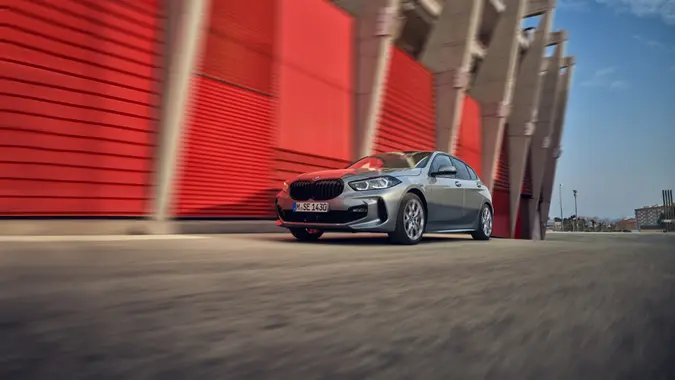What a Trump Presidency Would Mean for the US Auto Industry

Commitment to Our Readers
GOBankingRates' editorial team is committed to bringing you unbiased reviews and information. We use data-driven methodologies to evaluate financial products and services - our reviews and ratings are not influenced by advertisers. You can read more about our editorial guidelines and our products and services review methodology.

20 Years
Helping You Live Richer

Reviewed
by Experts

Trusted by
Millions of Readers
The auto industry could undergo another makeover if former President Donald Trump wins a second term to the White House this year. While President Joe Biden has made the transition to electric vehicles a cornerstone of his administration, Trump sounds determined to undo many of Biden’s EV policies and move the needle back in favor of gasoline-powered cars. However, whether (and how much) he’d succeed is no sure thing.
As S&P Global noted in a January report, the EV and battery industries got a big leg up from two key pieces of Democratic-led legislation that passed under Biden: the Inflation Reduction Act and the Bipartisan Infrastructure Law.
Both bills earmarked many billions of dollars for clean energy initiatives, including a national buildout of EV charging infrastructure, expanded tax credits for electric vehicles and federal loans and subsidies to retool existing auto factories and retrain workers.
If Trump wins reelection, he may look to curb these laws and change or eliminate federal funding for the EV industry, according to S&P Global.
“A reversal or reduction of federal subsidies could cause OEMs, suppliers and battery companies to rethink their product and investment strategy, particularly as it relates to North American sourcing,” the report noted. That, in turn, could have an impact on both the gas-powered and electric vehicle sectors by helping the former and hurting the latter.
One of Trump’s central campaign themes is that “nobody wants to buy” electric vehicles, the Detroit Free Press reported. But that view doesn’t square with the facts. As the Free-Press pointed out, while there has been a slowdown in demand for EVs, sales are still on the upswing.
A record 1.2 million EVs were sold in the U.S. in 2023, according to data from Cox Automotive’s Kelley Blue Book. EV sales in the fourth quarter set a record for both volume and market share at 317,168 and 8.1%, respectively. Fourth-quarter EV sales increased 40% from the prior year, which KBB called a “strong result by any measure” even while acknowledging that “the oft-reported slowdown is real.” That slowdown is mainly the result of the EV industry coming up against increasingly difficult year-over-year comparisons.
EV sales could take a temporary hit if Trump succeeds in rolling back Biden-era incentives while also boosting the gas-powered auto industry. He aims to do the latter by easing emissions standards adopted under Biden and opening up more of the country to oil and gas drilling.
The wild card is how effective Trump would be in changing an automotive industry that has already moved into the next stage of its evolution. As the Free-Press reported, if he is elected and makes a move to slow the EV industry’s momentum, China could take over global leadership of the EV market and leave the U.S. and Europe way behind.
More From GOBankingRates
 Written by
Written by  Edited by
Edited by 

























